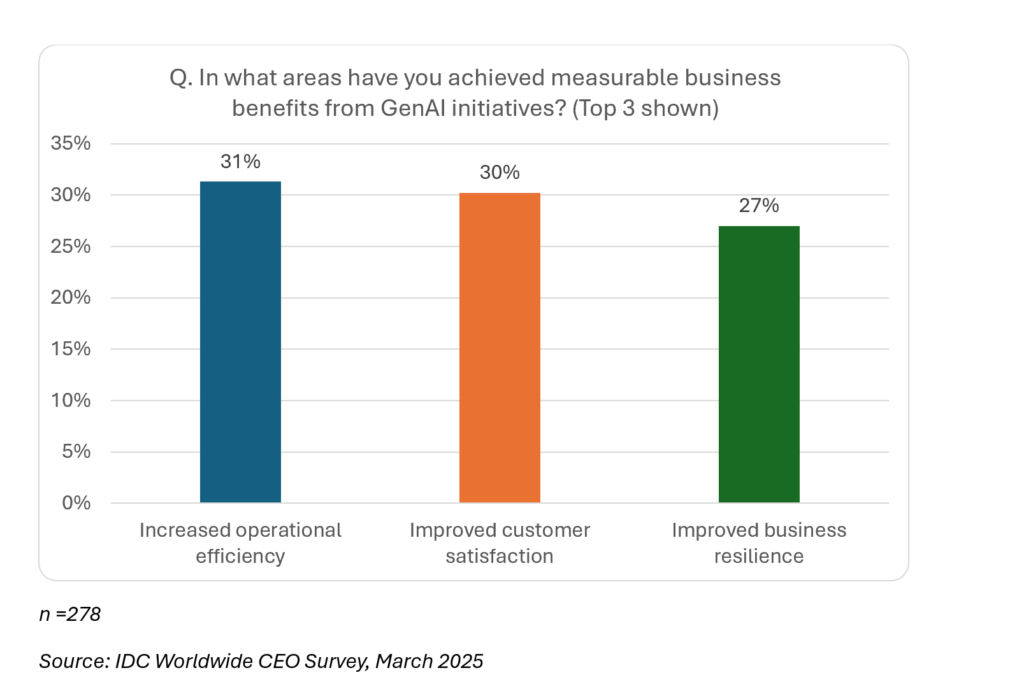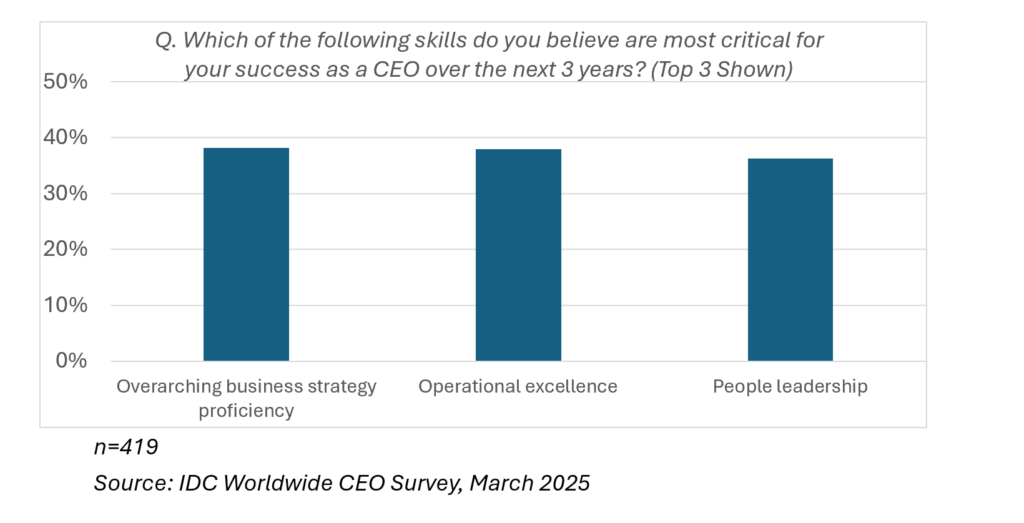With AI poised to reinvent how businesses operate, the stock market experiencing major swings, and geopolitical tensions growing, we can’t seem to shake “unprecedented times”.
Today, leaders are expected to move faster, while at the same time, making more informed decisions. They are juggling a delicate balance, embracing the best of technology with the best of humanity to transform their business for an AI world.
Earlier this year, IDC conducted our annual CEO Study including 419 CEOs and 15 in-depth CEO interviews. We explored business priorities, risks, approach to AI, technology priorities, and vendor perceptions.
Based on our research, there are 5 pillars of the 2025 CEO Tech Agenda.
1) Embrace the AI-Fueled Business
In our survey, we asked CEOs to select which word their company needs to focus on to thrive in 2025. The response acts as a pulse check for business sentiment. This year the word Innovation rose above the rest, underscoring the bold vision CEOs are carrying, anchored by the value proposition of AI technology.
The AI-Fueled business is built on the shoulders of digital business transformation. Year- over-year comparison shows that CEOs continue to grow their expectation on the proportion of revenue to come from digital products, services, and experiences. AI can be an accelerator for this transformation. Data shows CEOs are keen to use AI for reinvention, with over half stating they think AI will offer their organization a chance to reinvent its business model in 3-5 years.
Why such optimism? Perhaps because majority of CEOs state they are seeing measurable business benefits from their generative AI initiatives. When asking what those benefits are, operational efficiency rose to the top of the list, followed by improved customer satisfaction, and improved business resilience.
As CEOs frame their view on technology through the lens of business strategy, it is important to note that CEOs articulate improving customer experience as their top business priority in 2025.

2) Find growth amid uncertainty
Year after year, business leaders are facing a tough economic landscape. Whether its supply chain issues, an inflation crisis, quantitative tightening, and now trade wars, CEOs have had to mitigate the risk of economic pressures on their business.
It is evident from the conversations that I’ve had with CEOs that they are up for the challenge – as it seems to not just be in the job description, but in the DNA of the best leaders.
While challenges by region vary, CEOs across the world are looking at how technology investments can help their organizations gain a competitive advantage or at the very least, not fall behind their counterparts.
This year, AI agents have been a hot topic in the tech industry, and front of mind for CEOs. However, this doesn’t mean that CEOs are handing the reins over to robots. In fact, about half say that all decisions must be approved by humans. It is evident that those forcing an extreme strategy may and, in some instances, already have seen that backfire. Hand in hand with investments in AI Agents is the emphasis to invest in cybersecurity. Trust is a cornerstone of the CEO agenda this year, and we will explore more on that later.
3) Enable a strong tech leader
With so much tech talk in the C-Suite, it is no surprise that the tech leadership function is evolving. While Chief Information Officer continues to be the most common role, we have also seen a rise in Chief Technology Officers and Chief Information Security Officers this year.
Reporting structures also trend towards a more direct relationship between the CIO and the CEO. This has likely prompted the CEO to envision the CIO role as more strategic. In fact, when asked about the desired state two years from now, less than 1 in 4 CEOs say they want their CIO’s primary focus to be on cost reduction and risk management. Rather, their focus should be to either modernize IT to drive better business outcomes, orchestrate digital transformation to improve business agility, use AI to transform and create new revenue streams, and/or promote collaboration on AI initiatives across functions.
4) Safeguard trust with employees, technology and partners
Earlier, we noted how trust is a cornerstone of the 2025 CEO Tech Agenda. Arguably, developing trust with employees is the lynchpin of getting value from AI investments. We know that many knowledge workers are concerned about the impact of AI on the workforce. Employees must be involved in reimaging workflows with AI, their expertise with the day-to-day must be valued, and leaders must be honest about where along the AI readiness journey their organization sits.
Secondly, CEOs must work with their tech leadership to ensure there is trust in technology. It is paramount that clarity exists on how outputs are determined, how data is shared, what biases may exist, and what is at risk moving forward with new technology versus maintaining the status quo.
Lastly, CEOs must work across their C-Suite to ensure the organization is developing trusted relationships with technology partners. This year, CEOs elevated data governance and security practices as the top characteristic they value in their technology partnerships.
5) Lead effectively in an AI world
Beyond technology, CEOs express a critical need to hone skills around business strategy, operational excellence, and people leadership. As AI plays an increasingly larger role at work, leaders must show up with a human centered approach.

To land on the CEO agenda this year, it is critical to:
- Find the connection between AI and CX: Determine how and where in the customer experience you can make an impact. This is not limited to customer service, rather it extends beyond this function to the sales and marketing lines of business, and is supported by efficiency in operational functions like finance, supply chain, etc.
- Consider how you can build agility into your approach: With the economic stressors unrelenting, leaders will be looking for partners who move with agility and can provide guidance to find growth amid uncertainty.
- Secure the CIO as a champion: While the CIO may not always be the final decision maker, they are increasingly playing the role of strategic advisor on business transformation. Without them on board, it will be difficult to move forward.
- Become a trusted partner: The message from CEOs is clear, they are looking for trust in their partnerships, valuing strong data governance and security practices.
- Lead with humanity in the business relationship: While AI is great at a lot of things, building deep and trusted connections requires not just humans in the loop, but humans at the core.




